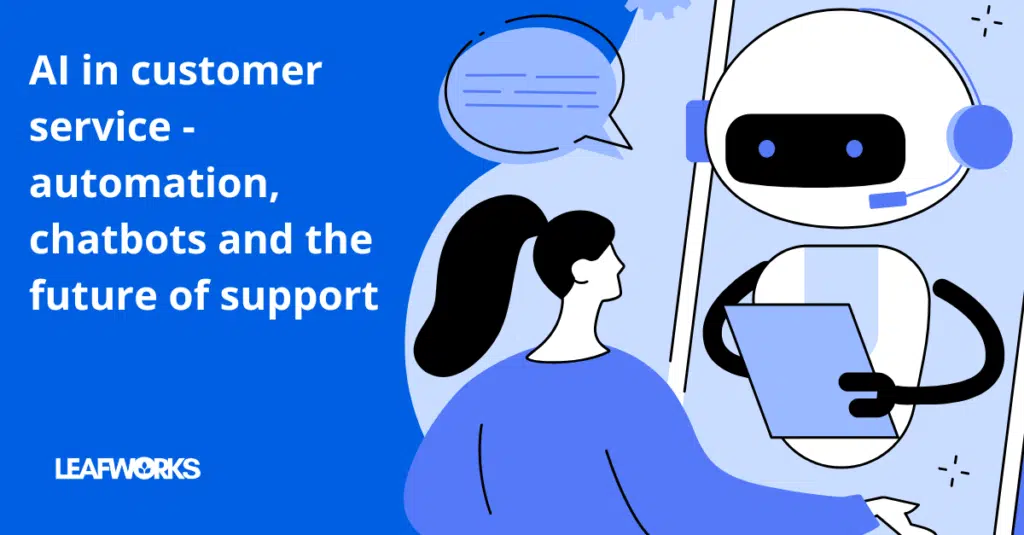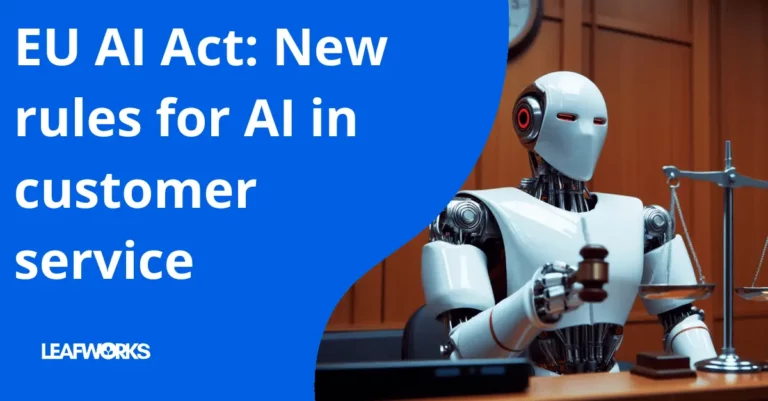“Will my team soon be replaced by AI?”
“Is AI really worth it for our customer service?”
“Aren’t chatbots just frustrating?”
“What are the legal requirements for using AI in customer service?”
If you’re asking these questions, you’re not alone. AI is the hottest topic in customer service – and also one of the most misunderstood. While many worry about job displacement or data privacy, the real value of AI lies in smarter workflows, faster service, and efficient support teams.
Let’s explore how AI transforms customer support, which tools matter, and how to use AI in Zendesk and beyond – without reinventing your service processes from scratch.
Directly to: Chatbots & AI Agents | AI for background processes | Practical example | Legal requirements | Implement AI

1. Why AI in customer service?
Customer expectations are rising: faster replies, personalized service, and availability 24/7.
At the same time, support teams deal with repetitive tasks, inefficient processes, and limited resources.
AI in customer service helps by:
- Automating standard inquiries
- Categorizing tickets and routing them to the right agent
- Extracting relevant data from customer messages
- Reducing manual work so agents can focus on complex issues
In short: AI is not a replacement for your team – it’s a productivity multiplier.
2. AI-Powered Customer Support Tools
Chatbots, AI Agents & Zendesk Features
Chatbots are often the first point of contact with “AI-powered customer support” – and don’t always have the best reputation. But not every technology works the same:
Rule-based chatbots: Rule-based chatbots have nothing to do with artificial intelligence, work with fixed response patterns and are well suited to simple inquiries.
AI-powered chatbots: AI-supported chatbots use machine learning to react flexibly to different formulations.
Conversational AI: These advanced bots not only analyze keywords, but also contexts, understand relationships and can interact more naturally with customers. → More on the topic
AI agents: autonomous virtual agents not only take over communication, but also carry out processes in the background, from creating tickets or querying the order status to independently composing responses and processing the entire ticket.
Despite their mediocre reputation, AI-supported chatbots have developed enormously in some cases and can now provide astonishingly precise answers and handle processes. Modern conversational AI and AI agents draw on extensive, verified data sources and use contextual analysis to avoid misunderstandings.
However, it is not only their technology that is crucial for the successful use of chatbots: companies should also ensure that the AI has access to high-quality data and that clear escalation processes are defined – for example, for particularly complex or sensitive inquiries that are better handled by a human agent.
Chatbots with the major providers
Zendesk:
AI Agents Essentials: The classic “Help Center Bot” provides generative AI responses and is included in all Zendesk Suite and Support plans.
AI Copilot: A suite of AI features as an add-on that supports agents with guided processes, initial response suggestions and ticket summaries.
AI Agents Advanced (formerly Ultimate): includes all the features of the Essential plan plus advanced features such as conversation flows, APIs and detailed analytics. Fully automated ticket solutions in chat and email are also possible.
→ Read more: Zendesk AI – the virtual assistant in customer service.
Salesforce:
- Einstein GPT uses generative AI to enable personalized customer communication in real time.
- Einstein bots automate routine requests and make complex processes more efficient.
Freshdesk:
- Freddy AI automates self-service through context-based recommendations and smart answer suggestions.
Backend Automation: The Real Game Changer
In our opinion, the biggest game changer of AI is not in the customer dialog, but takes place in the background: In process automation, the AI finds and structures predefined data within the tickets, working exclusively with verifiable data and fixed rules.
What can AI achieve in the backend?
- Automatic ticket categorization and forwarding optimizes the distribution of requests.
- Data extraction from customer inquiries enables direct processing of relevant information.
- Error detection and predictive analyses help to identify problems at an early stage.
- Triggering of actions such as voucher creation, return labels and much more.


Real Example: Zendesk + Leafworks AI Integration:
A customer requests a return via chatbot.
- The AI automatically analyzes and extracts relevant data from the request and compares it with existing information in the backend.
- If a return is legitimate based on the defined processes, a returns label can be generated in the system or by the third-party provider and included in the response.
- The customer receives their individual returns label and the ticket and the information in the backend are updated.
- If the customer has further questions that cannot be resolved by the chatbot, there is the option of forwarding them to the support team.
Result

Less manual work

Faster resolutions

Happier customers, happier agents
Legal Compliance: GDPR & EU AI Act
The new EU legislation on the use of artificial intelligence, the EU AI Act, sets out clear rules for customer service. The focus is particularly on transparency, data protection and ethical AI use. Companies that use AI agents or chatbots must ensure that users always recognize that they are interacting with an AI. Data protection also remains a key issue, especially when AI-supported analyses or decision-making processes are used in customer service.
→ More about the EU AI Act – and what it means for your customer service
In addition to the EU AI Act, the GDPR (General Data Protection Regulation) remains crucial for the use of AI in customer service. Companies must ensure that personal data processed by chatbots or AI agents is collected, stored and used lawfully. This applies, for example, to the automatic analysis of customer inquiries, the storage of support interactions or the forwarding of sensitive data by AI-supported systems. It is particularly important to have a clear data protection policy and to inform users transparently about the processing of their data.
To make it easier for companies to comply with GDPR requirements in customer service, Leafworks has developed a special GDPR app for Zendesk. This app helps to securely manage, anonymize or delete personal data – directly in Zendesk. This allows GDPR requirements to be implemented efficiently without the need for time-consuming adjustments to manual processes.
How to integrate AI into customer service
Many companies are faced with the same questions:
- Where does AI bring the greatest measurable benefit?
- Which processes should be automated first?
- Which tools are the right ones?
The right AI strategy depends on the challenges and goals a company is pursuing in customer service. What are the pain points, where do recurring tasks paralyze support? Which requests occur particularly frequently and have great potential to be automated?
To derive the greatest possible benefit from AI technologies, it is advisable to have a contact person with comprehensive expertise and a pragmatic approach.

Conclusion: Use AI strategically – not blindly
Artificial intelligence is no longer an experiment in customer service; it has long been part of modern day-to-day support. Companies that use AI correctly demonstrably benefit from more efficient processes, shorter response times and better customer communication. But AI is not a sure-fire success – without a well thought-out strategy, its potential remains untapped.
Leafworks helps companies to find the best solutions and integrate them into their customer service in the long term. Let us advise you. Arrange a brief meeting with us to find out which AI strategy is right for your company.
Why Leafworks?
Leafworks specializes in helping companies find the best AI solutions for their customer service. We are the market leader and DACH partner of the year for Zendesk.
With a wealth of experience in the integration and implementation of tailor-made customer service solutions, we not only provide consulting, but also technical integration and optimization – with the aim of not only finding (or developing) the best solution, but also implementing it quickly.
Talk to us!

Robert Cwicinski
Customer service expert
- CRM
- Automation
- Integrations
- Business Intelligence/BI
- Zendesk
- Digital Transformation
- Custom MVPs





